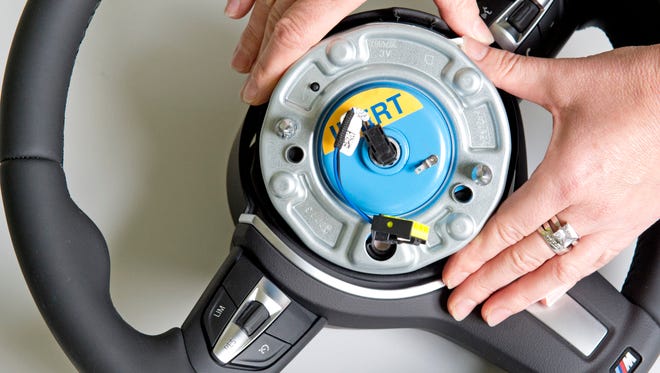What to expect in defective air bag maker Takata's bankruptcy
Corrections and clarifications: This story originally misstated the parties that settled economic-loss claims involving Takata air bags.
Troubled auto supplier Takata tumbled into Chapter 11 bankruptcy protection late Sunday night, following a costly scandal that has killed at least 16 people worldwide.
The Japanese supplier recently pleaded guilty in a U.S. court to criminal charges for its handling of the scandal, which involved exploding air bags.
The company agreed to pay $1 billion in penalties, including funds for people injured as a result of the fiery shrapnel hurled from its air bags. The defect has been blamed for more than 100 injuries and 16 deaths.

More than 42 million vehicles were equipped with the potentially defective parts, triggering the largest recall in U.S. history.
Here are several factors to watch:
1. Repairs won't stop: Although bankrupt companies can sometimes seek to sever obligations such as warranties, Takata will be required to prioritize the production of replacement parts.
Automakers have contributed hundreds of millions of dollars to accelerate the repairs, ensuring that the recall campaign will continue unimpeded during and after the bankruptcy.
As of May 26, automakers had replaced 38.1% of air bags affected by the recall, according to the National Highway Traffic Safety Administration.
2. Takata likely will get new ownership: Chinese-owned Key Safety Systems struck a tentative agreement to acquire Takata's main assets for $1.6 billion as part of the company's bankruptcy restructuring plan. A federal judge must authorize the move.
Key Safety Systems, whose U.S. headquarters is in Sterling Heights, Mich., would become the world's second-largest air bag manufacturer if the deal goes through, according to Evercore ISI analysts. The company would have market share of 20% to 25% following the deal, trailing only Autoliv's 40%.
3. Victims will still get compensation: People hurt by Takata air bags and families whose loved ones died because of the defect are eligible for compensation through a $125 million fund established as part of the company's criminal settlement.
Bankruptcy filings can disrupt previously pledged payments to third parties, but the victim compensation fund pledged as part of the government settlement is expected to take priority over other debts.
Former FBI director Robert Mueller had been appointed to administer the victim compensation funds, but he recently relinquished that post to take over as special counsel investigating Russian influence in the U.S. presidential election. His replacement is Kenneth Feinberg, who administer victim compensation funds for 9/11 and the General Motors ignition switch.
4. Current vehicle owners might get paid: Owners of nearly 16 million Toyota, Mazda, Subaru and BMW vehicles equipped with Takata's defective air bags recently reached a deal with those four automakers for $553 million in compensation to cover the economic losses they've incurred because of the scandal.
The deal will cost Toyota $278.5 million, BMW $131 million, Mazda $75.8 million and Subaru $68.3 million. It will not be affected by the bankruptcy.
The accord leaves open the possibility that consumers will reach similar agreements with other automakers, which will remain in place even following the bankruptcy filing.
Follow USA TODAY reporter Nathan Bomey on Twitter @NathanBomey.